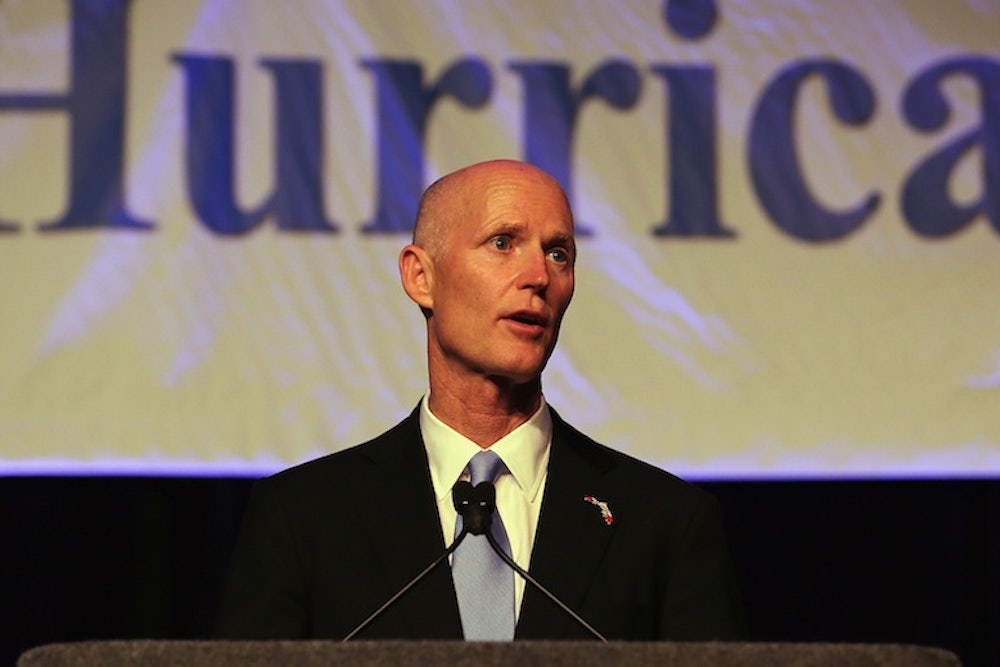If you want proof that the politics of climate change are shifting, pay close attention to what Rick Scott has been saying in Florida lately. Scott, who is running for reelection as Florida’s governor, has always denied climate change science. Except now he is reluctant to publicly admit this position, four years after he once said he was not “convinced that there’s any man-made climate change.”
In May, Scott hesitated to answer a question about man-made climate change, beyond saying, “I’m not a scientist.” Since then, he has gone from ignoring scientists who requested to meet with him to agreeing to a personal discussion, thanks to additional pressure from his opponent Charlie Crist. On the same day Next Generation—Tom Steyer’s political group—announced it would target Scott’s record, the GOP governor tried to bolster his environmental credentials by pledging a new fund to aid conservation efforts and to target polluters.
What changed? Scott’s electorate includes coastal residents who face the front lines of global warming. And as Floridians experience climate change first hand, their understanding of the threat changes. Rather than looking at it as a far-away issue, they begin to feel the impacts in their livelihoods and homes. It’s no wonder that the Republican governor considers it bad politics to dismiss sea level rise when Florida’s entire south coast faces crucial decisions of how to adapt to the changing climate. Outside spending from Steyer has helped to bolster this message, after years of lopsided political spending from fossil fuel groups.
One example of where Florida is hurting now is how property and construction have become too risky for insurers. According to the state-created storm risk management center, a growing number of insurance companies have exited the market entirely. Climate change and its related extreme weather both factored into that decision.
The rest of the country is learning the same lessons, even if the exact scenarios aren’t the same. Drought and wildfires have consumed California’s attention this year. Now, because of the drought’s record reach, residents have to restrict their water use or face a criminal fine. And this weekend, Toledo, Ohio couldn’t use their drinking water because of toxic algae that scientists long warned would thrive in climate change.
The truth is while climate change is a global problem to solve, it is at the local level where people don’t get to indulge in denial. Florida may turn out to be a case study in how politics is beginning to tip in climate activists’ favor.
—Rebecca Leber
Things to know
HEALTH CARE: Why has spending on health care slowed down? A new, innovative study backs up earlier suspicions: It’s mostly the economy, but not entirely. (Health Affairs, Vox)
IMMIGRATION: The federal government is shutting down some temporary shelters it had set up for unaccompanied minors, in part because fewer are coming across the border. (New York Times). And immigration advocates are scrambling to understand new court procedures for deportation hearings of the unaccompanied minors crossing the border. (Kirk Semple, NYT)
DEATH PENALTY: Ian Millhiser has the story of yet another botched execution, this time in Arizona. (ThinkProgress)
ECONOMY: Standard and Poor’s warns that growing wealth disparity in the U.S. "need[s] to be watched” because it risks worsening boom-bust cycles. (Associated Press)
Things to read
A Life and a Legacy: James Brady, who died on Monday, revolutionized the gun control debate. Lucia Graves wonders whether and how his crusade will live on. (National Journal)
What the Frack? Emily Badger reports on the new housing shortage in … Appalachia? (Wonkblog)
Debt: Jonathan Chait points to an incident last week with Senator Tom Coburn that shows the absurdity of the GOP's debt fear-mongering.
Inequality: At The Nation, Bryce Covert and Mike Konczal explain a different solution to wealth inequality.
Things at QED
Remember how Obamacare critics insisted insurance premiums would skyrocket in 2015? It looks like the critics were wrong. Again. Jonathan Cohn explains. The GOP might play lip service to the deficit, but Danny Vinik breaks down how they voted to increase the debt by nearly $1 trillion this year.
